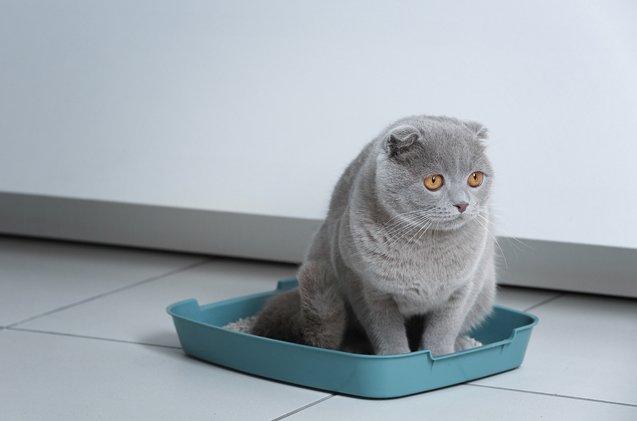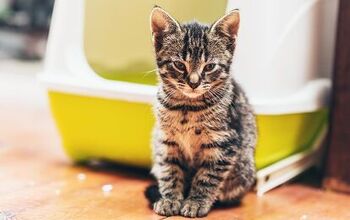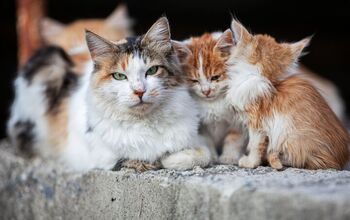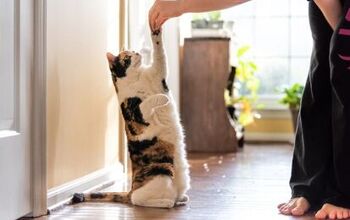Here’s Why Your Cat Runs Out of the Litter Box

Have you ever noticed that your cat will go to his litter box, do his business, and then run out of there as though he’s being chased by something? Then you’ve probably wondered what the deal is with this odd behavior. A few possible explanations are below to help you better understand your feisty feline friend.
Before getting into other potential reasons for your kitty’s strange post-litter-box habits, it is important to let you know that some cats may run out of the box if they are feeling discomfort or outright pain when they go to the bathroom.
Related: 5 Fresh And Effective Ways To Control Litter Box Odor
For example, a cat might be suffering from inflammation or an infection within the urinary tract, rectum, or colon. So it might be a good idea to have your pet examined by a veterinarian in order to rule out these problems, especially if your cat is showing other symptoms of being unwell.
It turns out that even feline experts aren’t quite sure why some cats dash out of their litter box while others don’t. Here are a few of the more common theories that they have come up with:
One theory states that kitties who are experiencing digestive problems, such as constipation or diarrhea, may want to rush out of the litter box ASAP in order to get away from the issue.
Your cat might make it a habit of getting out of the litter box as quickly as possible whenever he goes in there to relieve himself. But if this isn’t really normal or typical behavior for your pet, you might want to check out what he did in the box to see if he’s experiencing digestive upset. If you notice that he is indeed showing symptoms, you can then take steps to keep an eye on him and help him feel better, perhaps with the guidance of your veterinarian.
Everyone knows the feeling of relief that can come from going to the bathroom, especially if you have been waiting to go. Well, it might be the same for cats. When your kitty rushes out of the litter box, it might be a sign that she just feels so much better after going.
In other words, some cats might feel better after they have done their business in the box, so there is the idea that kitties who feel relieved will showcase their happiness by sprinting. And, once they have let out this energy, they might settle down right away.
Related: The Most Common Litter Box Mistakes You’re Making
If you have ever had the pleasure of seeing a mother cat take care of her kittens, you know that she helps them a lot when it comes to going to the bathroom and staying nice and clean.
Well, another theory states that, even though kittens need their mother’s help to clean themselves off after they go to the bathroom, adult cats want to flaunt their independence. In other words, they might want to get your attention to let you know about what they have accomplished.
We know, this sounds a bit strange, but we also know that felines can be quite quirky, so there might be some validity to this theory. What do you think?
When your cat runs out of the litter box, the explanation might be surprisingly simple: the litter has gotten too dirty for his liking. Kitties prefer going into clean litter boxes, just like people always want to use a clean toilet, so making it a point to keep your furry friend’s litter clean is necessary.
The next time your cat rushes out of the box, take a look to see if it needs to be cleaned or if the litter needs to be thrown out and replaced with fresh litter. It’s just one of the basic things you have to do to keep your feline companion happy. And it is also a good way to prevent your pet from becoming so disgusted with the box that he ends up going to the bathroom outside of it, creating a huge mess.
There is a fascinating theory that touches upon the evolution of felines. As you know, cats typically dig a hole in order to cover their waste. This behavior seems to have been passed down to domestic kitties from their wild ancestors. Beyond burying their waste, though, cats might not like the idea of even being near an area where waste is found. So rather than potentially exposing themselves to pathogens and parasites, they would prefer going to the bathroom, covering it up, and leaving it behind.
Yet another theory also taps into the evolution of cats, this time focusing on the harsh reality that they can become prey. If a cat were to defecate in the great outdoors, he might make himself vulnerable to attacks from other animals. The scent and sight of the waste could give away a cat’s location, so burying it and running away from the area might help a cat survive, just in case a predator is nearby. Even though your kitty might feel totally safe in your home, and there is no reason to fear predators, he might still instinctually feel the need to behave this way.
But what about cats who don’t bury their poop, you say? Well, experts claim that those might be dominant felines who are so confident in their ability to fight an enemy and win that they don’t even care about covering their poop. Or they’re just in a hurry to get out of the area and find safer ground.
When it comes down to it, no one really knows why some kitties run out of their litter box while others don’t do it at all, or why some cats exhibit this type of behavior only on some occasions while others do it all the time. It’s interesting to consider the theories discussed above, and you might even find that, after observing your kitty, you are able to figure out why he rushes out of the box as fast as he can.
Ultimately, as long as your furbaby isn’t exhibiting signs of illness and he doesn’t have any medical conditions that need to be addressed, you likely don’t need to worry. It’s just one of many behaviors that help maintain the mystery of our feline companions.

Lisa Selvaggio is a freelance writer and editor, and our resident cats-pert, with certifications in pet nutrition and pet first aid. She enjoys producing content that helps people understand animals better so they can give their pets a safe and happy home.
More by Lisa Selvaggio























